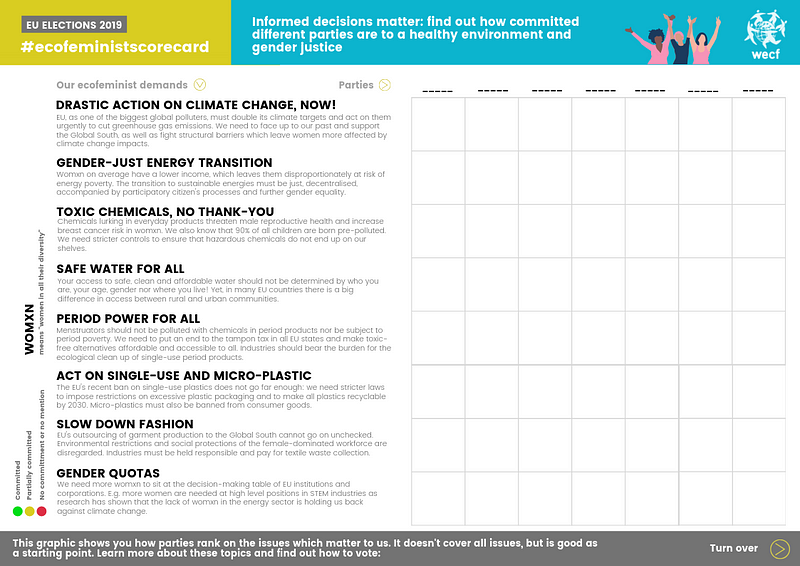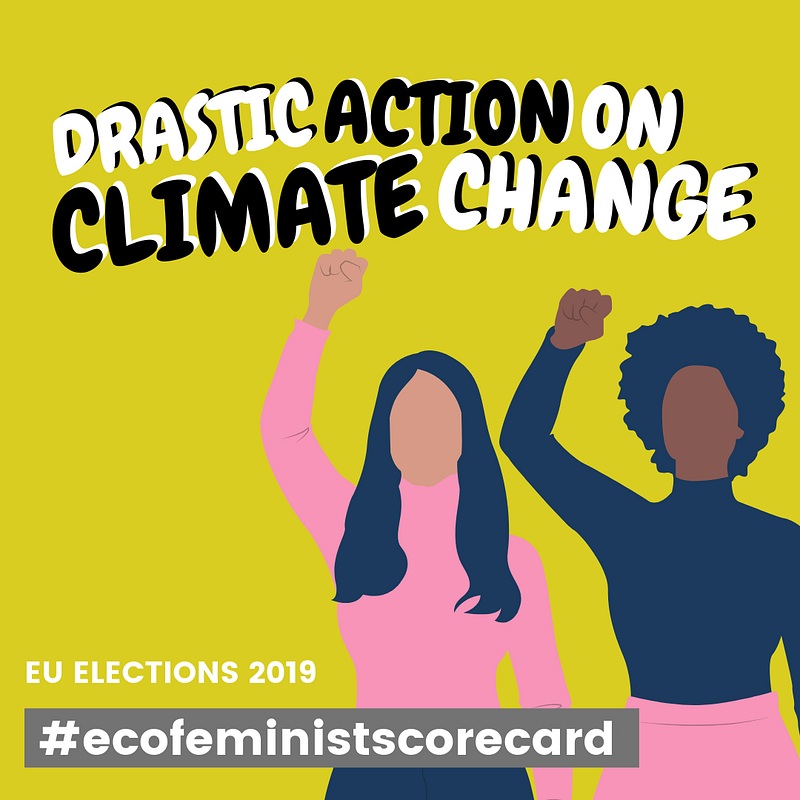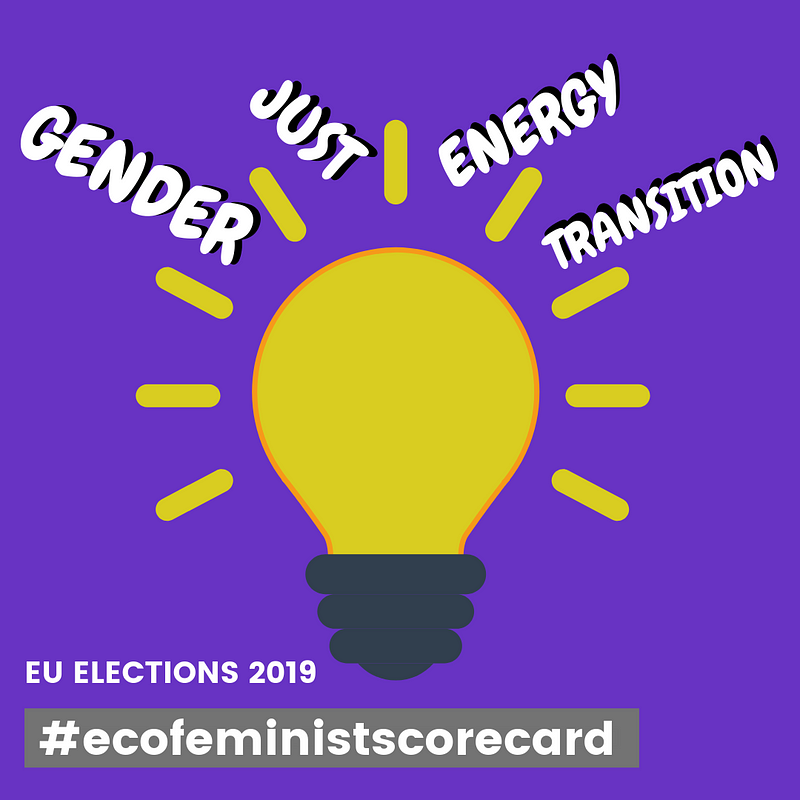EU elections: how to use your vote for climate justice and feminism?
Are you ready for the EU elections? Find out which parties are championing the issues you care about with the ecofeminist scorecard
An article by Hanna Gunnarsson, Anja Rühleman & Jane Kenny, Women Engage for a Common Future (WECF)
Sunday* is the day! Perhaps you are one of those super prepared voters who has read all the manifestos, watched all debates and already know who you will vote for? Good for you! Or perhaps you are like the other 99% of us, a bit lost in all the party jargon? Well if you are the latter, don’t stress, we have created an ecofeminist scorecard for you to help you in your decision.
Did you know that in the last EU elections, only 40.7% of the women in the EU’s 28 member states voted? Since the last elections, we have seen a strong uprise of right wing conservatism (and their climate denial) in our region. On the other side of the coin, we have also experienced two landslide movements which have shook out existence, #metoo and the youth climate emergency movement #fridaysforfuture. We therefore wanted to create a tool to help youth find their way among party politics and learn how they can identify a decision-maker who stands up for the issues important to them.
The ecofeminist scorecard is a regional grassroots campaign. That means that you can use the empty scorecard yourself to score parties in your own country. So far we have scored, based on their manifestos: Germany (in Deutsch and English), Netherlands, France, Sweden, Portugal, Spain, Ireland, and EU parties.
Remember, the scorecard is a first step in finding your way through party jargon. It is based on party manifestos. From past experience, we know that manifestos can be filled with empty words. So we encourage you to dig deeper, to read articles and look at how they have voted within the EU in the past. It might also be useful to check up which EU group your party belongs to, and the EU parties’ manifestos.
We looked at various different issues, from climate and energy, to chemicals, water, menstruation, plastic, fashion and participation from an ecofeminist point-of-view. We realise there are many other issues which you can apply the ecofeminist lens (e.g. agriculture and food), and we encourage voters to use the search tools we provide here to also look at other issues that we might not have covered.
Drastic action on climate action, now!
We have all seen it: the footage of devastating forest fires, crippling heat waves and record breaking storms. Climate chaos has become weekly news. We are witnessing the impact of a 1°C increase of global temperature. These disasters are hitting the Global South the hardest, with women in particular taking a disproportionately heavy blow. Gendered roles mean womxn(1) are responsible for the provision of threatened resources like water, fuel and food. EU’s role in producing 17% of CO2 emissions ever emitted speaks for our historical responsibility to push beyond our frankly modest commitments to cut emissions by 40% by 2030. Polluting is just too cheap. Big industry will continue to resist a carbon phase-out unless we have a minimum price on carbon pollution to properly encourage countries to end the era of fossil fuels.
EU, as one of the biggest global polluters, must double its climate targets and act on them urgently to cut greenhouse gas emissions. We need to face up to our past and support the Global South, as well as fight structural barriers which leave women more affected by climate change impacts. These are the parties committed to radical and progressive change to our current climate emergency:
- EU parties — Green, PES, EFA, EDP, EPP
- Germany — Die Linke, Bündnis90 die Grüne, SPD, Die Frauen, ÖDP
- Netherlands — GL, PvdD, PvdA, D66, SP, CU
- France — Fi, EELV, LREM
- Sweden — Feministiskt Initiativ, Vänsterpartiet, Socialdemokraterna, Miljöpartiet
- Portugal — PSD, PS, Bloco de Esquerda, CDU PCP+PEV, Livre
- Spain — PP, Unidos Podemos, Ahora Repúblicas, Pacma
- Ireland — Labour, Fine Gael, Fienna Fail, Greens
Gender just energy transition
Energy poverty may be something we think is limited to the Global South, therefore it might be shocking to find out that more than 54 million people struggle to pay their energy bills in the EU. The EU’s transition to 100% sustainable energy must protect the people whose livelihoods are affected by the economic shift, including coal communities and gas and oil workers, as well as create educational programs. To be fair and equitable, this transition must also challenge the gendered division of labour, which places women in often low waged, insecure and informal subsistence and service industries. We need energy and resource democracy, where local people, particularly women, are allowed to make decisions over the use of local resources and the best way to fulfil their needs. How committed to sustainable energy are the parties in your country?
Womxn on average have a lower income, which leaves them disproportionately at risk of energy poverty. The transition to sustainable energies must be just, decentralised, accompanied by participatory citizen’s processes and further gender equality. These are the scored parties committed to a gender just energy transition:
- EU parties — Greens, PES, European left, EFA
- Germany — Die Linke, SPD, Die Frauen
- Netherlands — GL, PvdD, PvdA, SP, CU
- France — Fi, PS, EELV, LREM
- Sweden — Feministiskt Initiativ, Vänsterpartiet, Centerpartiet
- Portugal — PSD, Livre
- Spain — PP, Unidos Podemos, Ahora Repúblicas, Pacma
- Ireland — Labour, Fine Gael, Fienna Fail, Greens, Social Democrats
Learn more about the ecofeminist scorecard, visit: www.wecf.org/ecofeministscorecard
* Sunday is the last day for voting in the EU elections. Please note though that some countries are voting ahead of Sunday. To find out when your country is voting, see: https://europa.eu/youreurope/citizens/residence/elections-abroad/european-elections/index_en.htm
(1) Womxn — means “women in all their diversity”, with focus on intersectionality and includes women as well as non-binary persons.




